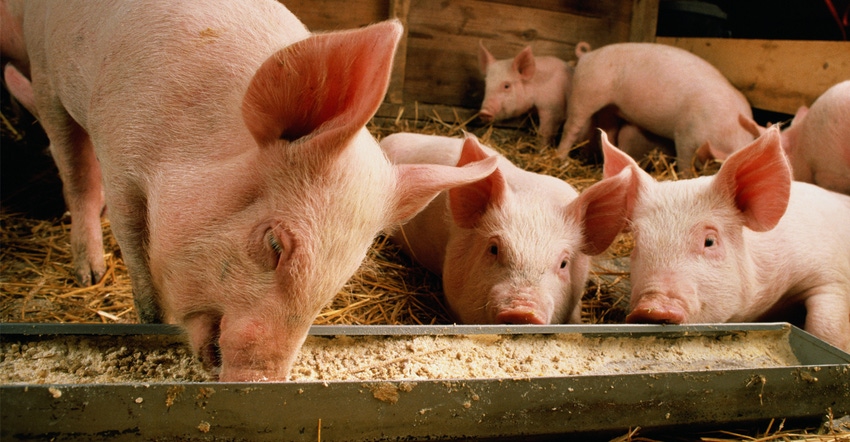September 30, 2020

Michigan State University will host a precision livestock farming virtual field day from 10 a.m. to noon Oct. 7.
Researchers and outreach specialists from MSU, the University of Nebraska-Lincoln, the University of Wisconsin and KU Leuven in Belgium will focus on new technologies for cattle, swine and poultry production, as well as the long-term benefits of precision farming techniques on farm economics and animal welfare.
“We are excited to offer unique insight into PLF technology that is not typically possible with an in-person field day,” says David Thompson, MSU Extension livestock educator. “In this virtual format, we are able to gather some of the best minds in PLF from around the world.”
The live event will be presented in an interactive format with conversation, question-and-answer sessions, and videos from presenters. Topics will be of interest to a wide range of audiences, including livestock producers, nutritionists, geneticists, researchers in animal science, veterinarians, engineers working in agriculture, the animal well-being community, and students interested in these fields.
Program features
Here are some topics that will be included in the program:
Introduction. Janice Siegford, a professor in the MSU Department of Animal Science, and Madonna Benjamin, an assistant professor and MSU Extension swine veterinarian in the MSU Department of Large Animal Clinical Sciences, will provide an overview of PLF.
They will share their more than 20 years of experience in using technology to monitor animals. Siegford and Benjamin will provide an overview of what PLF technology is, covering the types of technologies that can be used in animal systems and what can be measured. They will discuss the problems PLF can help to solve and some of the challenges in trying to adopt PLF strategies.
Cattle. Joao Dorea, an assistant professor of precision agriculture and data analytics at the University of Wisconsin, will discuss how computer vision systems can be an effective tool to integrate animal-level information and create predictive modeling for precise management decisions in dairy farms.
In livestock operations, systematically monitoring animal body weight, biometric body measurements, animal behavior, feed bunk and other complex phenotypes is unfeasible because of labor, cost and animal stress.
Applications of computer vision are growing in importance in livestock systems because of their ability to generate real-time, noninvasive and accurate animal-level information. Such technology has emerged as a powerful tool to predict animal identification, body weight, biometric measurements, behavioral traits and feed bunk score.
Swine. Tami Brown-Brandl, a professor and the Dr. William E. and Eleanor L Splinter chair at the University of Nebraska-Lincoln, and Madonna Benjamin will share their knowledge on the swine industry’s adoption of PLF.
They will address success stories in feeding and watering systems, as well as recent introductions to reduce piglet mortality in farrowing operations (sound and electrical stimulation). They will highlight emerging approaches designed to address key production challenges, including disease detection and aggression in grow-finisher facilities and farrowing facilities.
Poultry. Tomas Norton, a tenure-track assistant professor in the Division of Animal and Human Health Engineering at KU Leuven in Belgium, will cover the latest developments around PLF in the poultry sector by going through some of the challenges in taking this technology from the lab to the farm.
He also will cover how to unlock great potential on off-the-shelf sensors to create a cost-effective, data-driven approach to poultry farming.
Future directions of PLF. Juan Steibel, an associate professor in the MSU Department of Animal Science and the MSU Department of Fisheries and Wildlife, will address possible uses of raw and preprocessed data streams obtained from PLF technologies for nonmanagement applications in the livestock industry.
In particular, he will discuss the use of PLF data streams for making selection decisions for genetic improvement, assessing welfare at the individual and group level, and for on-farm product or technology testing. For each case, Steibel will compare the current state of data collection and use with the perspectives for using PLF data streams, and how that has the potential of transforming the livestock industry beyond facilitating management.
Participants must register online, and a Zoom link for the event then will be sent. Questions about registration should be directed to Megghan Honke Seidel at [email protected]. The program will be recorded, and archived videos will be available shortly after the event ends.
Visit the Virtual Field Days website to learn more about MSU’s other virtual field day events.
Source: Michigan State University Extension, which is solely responsible for the information provided and is wholly owned by the source. Informa Business Media and all its subsidiaries are not responsible for any of the content contained in this information asset.
You May Also Like




